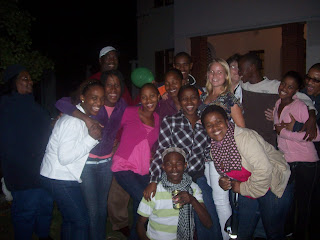
Leaving South Africa feels like being ripped apart from a second home. We’ve all grown together in a unique way as a household. We grew together around issues that would never be brought up outside of our unique learning environment. We each had our own internship and volunteer project and we’d all hear stories from everyone about what their experiences and what they were learning.
At times we would be involved in each other’s internships or volunteer projects. I found myself one Saturday at a protest against the government that Dan brought me and a few students along with. I found myself on a few Fridays walking dogs and playing with cats at an animal shelter where Michelle and Chelsea volunteered .
Teachers didn’t just teach us inside of the classroom and our internship coordinators weren’t just our superiors. Many were met with outside of the classroom at restaurants like Swingers for Monday night jazz, and at the braai (barbecue) our household threw one Sunday, on our excursion trip, and on occasion at many of the dinners Marita held at her flat. The role a teacher should have in their student’s learning experience has been changed in my eyes. They shouldn’t just lecture a class
A variety of beaches were all within a 20 – 45 minute minibus or train ride. Surf, lounge around, watch the sunset, or play in the waves. Lions head is a mountain that is 15 minutes away from our house. It overlooks the entire city. A few of us hiked up the mountain twice on evenings in time to see the sun set, the full moon rise, and the entire city lights turn on.

The book lounge 20 minutes away in the city holds speakers every week that address issues like poverty, HIV/AIDS, and gender inequality (the free food and wine is great too). Class was class, but we’d be able to apply our knowledge everywhere we went in Cape Town, whether it was listening to a speaker or conversing with people at our internship or anywhere really. Rugby, jazz, soccer, pool games, running with housemates, township visits, food/wine tasting festivals, are all just a few of the activities I will be missing.
I found myself doing something new almost every day. I didn’t keep a set routine to abide to. If someone brought up an activity I would often tag along without much questioning.
Before the trip I was quite pragmatic in my routines. I was more distant, kept to the books and work, and fantasized about landing a job day in and day out that would yield an above par starting salary after graduation. Not much else concerned me. I have to admit that I was pretty boring and predictable.
The first month was difficult for me. I could barely enjoy myself during the orientation week because it was a “relaxed” time where there was no work or assignments to be done. I jittered around and took notes at many of the places we went to like I was going to be tested or something. Not cool. I was a bit of a workaholic before the trip and a month or so into the trip. I’m sure anyone that knows me can affirm that. The “South Africa” laid back lifestyle wouldn’t get through to me I thought to myself.
But I have relaxed a bit and gotten a taste of a wide variety of lifestyles. One of my favorite days was a Saturday that started out at a protest against the government with the Social Justice Coalition followed by a Food and Wine tasting festival and then the International Jazz Festival that night. The first part of the day I was surrounded by disadvantaged Cape Townians from the less well off areas. Most people were black. The second part of the day at the food/wine tasting festival I was surrounded by fairly well off people – mostly white. The diversity in people and things you can do in a day in Cape Town astonishes me.
I can go on and on, but I won’t. I’m looking forward to stepping off of the plane on U.S. that I soon depart for in less than three hours from now (not really, but I don’t have a choice, so I might as well look forward to my return). What’s the same? What’s changed? Right now it feels like I am returning to somewhere else that wasn’t where I departed from – almost like another study abroad experience.



























